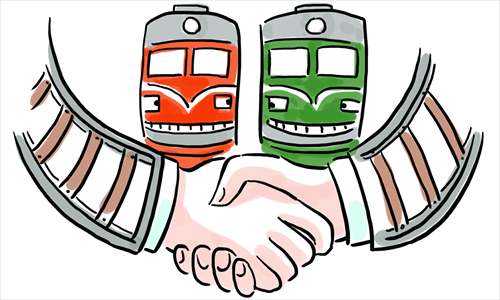Belt and Road ties Belgrade closer to Beijing’s friendship

Illustration: Liu Rui /GT
Chinese President Xi Jinping embarks on an official visit to Serbia Friday - Beijing's first top visit to Belgrade in 32 years. Serbian officials expressed high hopes about Xi's European tour, which will stop at Poland and Uzbekistan next week. The development of Beijing-Belgrade relationship after the visit is under heated discussions as well.
As a formerly socialist country, Serbia was an intimate friend of China during the Cold War. The two nations have seen increasing cooperation in infrastructure, finance and cultural exchanges. Given Belgrade's significant geographical location in Central and Eastern Europe (CEE), China-Serbia infrastructure cooperation is top in their bilateral relationship, which is reflected by Belgrade's leading status in transport and infrastructure cooperation under the "16+1" format, a cooperative mechanism between China and the CEE countries.
Xi proposed to "build transport corridors connecting the Baltic Sea and the Pacific Ocean, and linking Central Asia with the Indian Ocean and with the Persian Gulf" at the 2013 SCO summit. Serbia, with its key location in the Balkan Peninsula, serves the Xi-proposed transport corridors.
The construction of the Hungary-Serbia railway, of which the Serbian section will be carried out by a consortium of Chinese companies, is expected to improve the connectivity of the Balkan Peninsula and clear barriers from the Balkan countries to Piraeus, a transit hub connecting Europe, Asia and Africa. Under Xi's leadership, China has the capability and experiences to build railways in the mountainous peninsula.
China's "Belt and Road" initiative is of vital significance to Serbia as well. Interconnection will help Belgrade more integrated into Europe's economic activities, which is a prerequisite for the nation to narrow the gaps with other developed European countries and to apply for the EU membership. The "16+1" cooperation will prompt the EU countries to play a more active role in Europe's economy, and create favorable conditions for the non-EU countries to apply for the EU membership.
In addition, as a consequence of transportation difficulties and a lack of resources, the development of the Balkan countries is problematic. China's "Belt and Road" initiative will help these nations to be more involved in the international division of labor, facilitate energy imports and exports, raise citizens' living standard and alter the current undiversified economy. Therefore, Xi's visit is highly anticipated and welcomed by local citizens and officials.
Europe has drawn plans to aid connectivity in the CEE as well, and thus is cautious of China's motives in promoting the "Belt and Road" initiative. It is true that the "16+1" cooperation may squeeze the West's clout in the region. However, China's initiative respects the EU standards and brings no harm to any concerning party.
The Western countries will eventually realize that China-contributed connectivity will help the CEE countries to be more economically integrated in the EU, build mutual trust and dispel misunderstandings between the CEE and the West. In fact, the EU now views 16+1 more and more positively and has said it will cooperate with it under the China-EU mutual connectivity platform.
China and Serbia signed a joint declaration on strategic partnership in 2009. The two nations cherish their decades-old friendship and mutual understandings. The long-awaited visit of Xi will reveal a new chapter of Beijing-Belgrade traditional friendship. The "Belt and Road" initiative will advance China-Serbia relationship to a new level as well.
The author is a professor of School of International Relations and director of Institute of International Affairs Center for European Studies at Renmin University of China. His recent publication includes Belt & Road Initiative: What China Will Offer in Its Rise. opinion@globaltimes.com.cn Follow us on Twitter @GTopinion